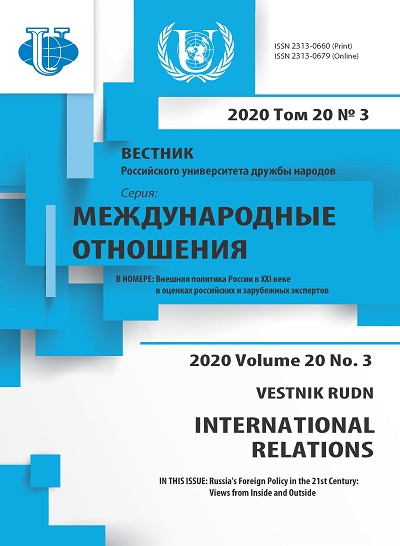Sanctions in U.S. - Russia Relations
- Authors: Ziegler C.E.1
-
Affiliations:
- University of Louisville
- Issue: Vol 20, No 3 (2020): Russia’s Foreign Policy in the 21st Century: Views from Inside and Outside
- Pages: 504-520
- Section: THEMATIC DOSSIER
- URL: https://journals.rudn.ru/international-relations/article/view/24624
- DOI: https://doi.org/10.22363/2313-0660-2020-20-3-504-520
Cite item
Full Text
Abstract
Given America’s leading position in the global economy, the U.S. government has frequently leveraged that power to punish “rogue states”, discourage nuclear proliferation, promote democratization, and create pressure for regime change. Washington relied on economic incentives in relations with Russia after 1991, but since 2012 the United States has utilized a broad range of economic sanctions against Russian side, leading to a significant deterioration in what was already a troubled relationship. In contrast to earlier comprehensive sanctions like those imposed on Iraq and Haiti, the U.S. is now crafting “smart” or targeted sanctions designed to exert maximum pressure on selected Russian elites and firms. Rather than evaluating the effectiveness of these measures on changing Russian behavior, the author explores the neglected domestic dimension of the U.S. sanctions process to improve understanding of U.S. foreign policy. This article draws on primary sources in the form of Congressional legislation, executive orders, and official statements to analyze U.S. sanctions imposed on Russia, and develops three brief case studies - the Magnitsky Act, post-Ukraine sanctions, and the Countering America’s Adversaries Through Sanctions Act - to explicate the main issues and actors driving U.S. sanctions. The author argues that domestic factors, including Congressional pressures and interest group activity, are critical to understanding U.S. sanctions regimes. While President Donald Trump has frequently resisted congressionally imposed sanctions, expectations for a more conciliatory approach towards Russia under the Trump administration have not materialized.
About the authors
Charles E. Ziegler
University of Louisville
Email: Charles.ziegler@louisville.edu
PhD in Political Science, Professor of Political Science and University Scholar, University of Louisville (Kentucky, USA), Faculty Director, Executive Director, Louisville Committee on Foreign Relations Louisville, USA
References
- Baldwin, D. (1985). Economic Statecraft. Princeton: Princeton University Press
- Barry, C.M. & Kleinberg, K.B. (2015). Profiting from Sanctions: Economic Coercion and US Foreign Direct Investment in Third-Party States. International Organization, 69 (4), 881-912. DOI: 10.1017/ S002081831500017X
- Browder, B. (2015). Red Notice: A True Story of High Finance, Murder, and One Man’s Fight for Justice. New York: Simon and Schuster
- Chan, S. & Drury, A.C. (2000). Sanctions as Economic Statecraft: An Overview. In: Chan, S. & Drury, A.C. (Eds.). Sanctions as Economic Statecraft: Theory and Practice. Houndmills: Palgrave Macmillan. P. 1-16. doi: 10.1057/9780230596979_1
- Connolly, R. (2018). Russia’s Response to Sanctions: How Western Economic Statecraft Is Reshaping Political Economy in Russia. Cambridge: Cambridge University Press.
- Crawford, N. & Klotz, A. (Eds.). (1999). How Sanctions Work: Lessons from South Africa. New York: St. Martin’s Press.
- Drezner, D.W. (1999). The Sanctions Paradox: Economic Statecraft and International Relations. Cambridge: Cambridge University Press.
- Drezner, D.W. (2015). Targeted Sanctions in a World of Global Finance. International Interactions, 41, 755-764. doi: 10.1080/03050629.2015.1041297
- Early, B.R. (2015). Busted Sanctions: Explaining Why Economic Sanctions Fail. Stanford, CA: Stanford University Press.
- Firestone, T. & Contini, K. (2018). The Global Magnitsky Act. Criminal Law Forum, 29 (4), 617-628. doi: 10.1007/s10609-018-9353-z
- Gibbons, E.D. (1999). Sanctions in Haiti: Human Rights and Democracy under Assault. Westport, CT: Praeger.
- Gilligan, E. (2016). Smart Sanctions against Russia: Human Rights, Magnitsky and the Ukraine Crisis. Demokratizatsiya, 24 (2), 257-277.
- Gordon, J. (2011). Smart Sanctions Revisited. Ethics & International Affairs, 25 (3), 315-335. DOI: 10.1017/ S0892679411000323
- Gordon, J. (2012). Invisible War: The United States and the Iraq Sanctions. Cambridge: Harvard University Press
- Gould-Davies, N. (2020). Russia, the West and Sanctions. Survival, 61 (1), 7-28. DOI: 10.1080/ 00396338.2020.1715060
- Hufbauer, G., Schott, J.J., Kimberly, A.E. & Oegg, B. (2009). Economic Sanctions Reconsidered. 3rd edition. Washington, D.C.: Peterson Institute for International Economics
- Jentleson, B.W. (2000). Economic Sanctions and Post-Cold War Conflicts: Challenges for Theory and Policy. In: Stern, P.C. & Druckman, D. (Eds.). International Conflict Resolution after the Cold War. Washington, D.C.: National Academy Press. P. 123-171
- Kaplowitz, D.R. (1998). Anatomy of a Failed Embargo: U.S. Sanctions against Cuba. Boulder, CO: Lynne Rienner.
- Khudoley, K.K. (2019). Russia and the USA: Cool War Ahead? Teorija in Praksa, 56 (1), 98-117.
- LeoGrande, W.M. (2015). A Policy Long Past Its Expiration Date: US Economic Sanctions against Cuba. Social Research, 82 (4), 939-966.
- Marsh, K. & Lantis, J.A. (2018). Are All Foreign Policy Innovators Created Equal? The New Generation of Congressional Foreign Policy Entrepreneurship. Foreign Policy Analysis, 14 (2), 212-234. doi: 10.1093/fpa/orw030
- Martin, L.L. (1992). Coercive Cooperation: Explaining Multilateral Economic Sanctions. Princeton, NJ: Princeton University Press.
- Niblock, T. (2001). “Pariah States” and Sanctions in the Middle East: Iraq, Libya, Sudan. Boulder, CO: Lynne Rienner.
- O’Sullivan, M.L. (2003). Shrewd Sanctions: Statecraft and State Sponsors of Terrorism. Washington, D.C.: Brookings Institution Press.
- Pape, R.A. (1997). Why Sanctions Do Not Work. International Security, 22 (2), 90-136. doi: 10.2307/2539368
- Petrovsky, V. (2014). Russia and East Asia in the Context of the Ukrainian Crisis: ‘No’ to Sanctions, ‘Yes’ to a New World Order. International Affairs (Moscow), 60 (6), 88-99.
- Weiss, T.G. (1999). Sanctions as a Foreign Policy Tool: Weighing Humanitarian Impulses. Journal of Peace Research, 36 (5), 499-509.
- Zarate, J.C. (2009). Harnessing the Financial Furies: Smart Financial Power and National Security. The Washington Quarterly, 32 (4), 43-59. doi: 10.1080/01636600903235890
- Zarate, J.C. (2013). Treasury’s War: The Unleashing of a New Era of Financial Warfare. New York: PublicAffairs.
- Ziegler, C.E. (2018a). Russian Diplomacy: Challenging the West. Journal of Diplomacy, 19 (1), 74-90.
- Ziegler, C.E. (2018b). China - Russia Relations in Energy, Trade and Finance: Strategic Implications and Opportunities for U.S. Policy. In: Ellings, R.J. & Sutter, R. (Eds.). Axis of Authoritarians. Seattle, WA: National Bureau of Asian Research. P. 51-80











